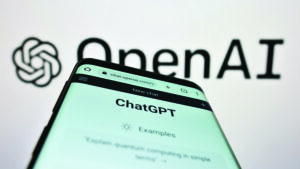
Time to chat about AI
By Jacob Stoller
Construction SoftwareFew new tech products have captured public attention like ChatGPT. The generative AI trend is already having an impact on construction.
ChatGPT, according to a ChatGPT query response, “can be a valuable tool in the construction industry in various ways, helping streamline processes, improve communication, and enhance decision-making.” The Large Language Model (LLM) that introduced generative AI to millions of users also provided a list of use cases, including for categories such as planning, risk assessment, communications, training, project management – virtually anything a construction company does other than build.
Generative AI is no panacea, but it’s expected to accelerate automation of back-office tasks in all sectors, including construction.
“I don’t think it’s going to replace workers, but it’s going to automate many labour-intensive alphanumeric tasks, bringing them reasonably close to completion,” says Thomas Strong, principal at construction tech firm wired.construction and CEO of Building Transformations. “I think the impact will be massive.”
The power behind AI models is that they learn from the data that is fed to them, and therefore improve with wider usage.
“The more people use these tools, the stronger the models are,” says Brandon Milner, senior vice-president of digital and data engineering at EllisDon. “That means that they’ll acquire more precise data, and the results from questions will be more accurate.”
According to Milner, the technology could impact 30 per cent of a firm’s non-construction workload in categories such as customer communications, regulatory reporting, legal contracts and business planning. The most immediate target is likely to be mandatory routine documents that are time consuming to create.
Integration between LLM engines and construction apps will be a key enabler, and tech vendors are quickly jumping in.
“We expect ChatGPT to be used to drive a more conversational engagement with data,” says Kris Lengieza, vice-president of global partnerships and alliances at Procore Technologies.
ChatGPT’s human-like interface makes it easy to apply.
“If you need to do a building code check, you could simply ask a question like ‘what are the requirements for a residential staircase in Ontario?’,” says Strong, “and it will point you to all the references in the code.” That convenience, however, comes with a caveat. “You have to check it carefully, though,” he warns, “because it may not be right. In some cases, it makes up codes that don’t exist.”
Generative AI’s tendency to invent answers, or the so called “hallucination factor,” is a major hurdle that has many analysts worried. Human input, therefore, has to be a planned component of any AI-assisted task.
“If you’re facing a two-hour task, AI can get you 70 per cent of the way in the first five minutes,” says Strong. “Then you have the remaining time to refine, improve, and augment. So, your end result might be many iterations better.”
LLM’s aren’t limited to executing clearly delineated tasks either. They can also assist with broadly-defined queries, or qualitative matters such as presentation style.
“ChatGPT could help you present a business plan in a slightly different format,” says Milner. “It could look at other business plans from similar companies and format your report based on that. Or you could upload a report and ask it to create a PowerPoint presentation from it.”
MANAGING THE RISKS
These LLM applications will bring familiar risks to the fore much sooner than expected, including the threat of inaccurate information.
“Organizations need to have a strict data governance policy in place,” says Strong. “If you’re relying on these tools and they’re part of your engineering workflow, or for any input on what leaves your office in the way of direction, there has to be a validation process.”
Proliferating these standards throughout the organization, Strong notes, is no minor undertaking.
The convenience and extreme versatility of LLMs also provides myriad opportunities for inappropriate disclosure of data.
“If you uploaded a pricing schedule or an estimate and asked ChatGPT to format it, that data might be used to train the AI engine,” says Milner. “That means that a competitor could potentially access if from a search.”
EllisDon, Milner says, uses a private version of ChatGPT, and blocks users from using the free version on the company network. ChatGPT now has a security setting for its free version which the vendor says prevents the data from being used for training purposes.
Ultimately, data governance is not a technology issue, but a senior management issue that many companies have yet to address. Perhaps one of the most significant benefits of LLM will be that it forces companies to get serious about data governance.
Jacob Stoller is principal of StollerStrategies. Send comments to editor@on-sitemag.com.





